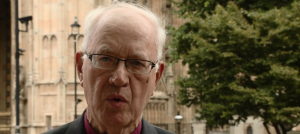
The British Humanist Association (BHA) has welcomed a letter by a group of prominent religious leaders advocating a change to the law on assisted dying for the terminally ill. In the letter to the Daily Telegraph, the group of leading priests, bishops and rabbis insisted that religious teaching should not be used to stop those who are terminally ill from dying at a time of their choosing, saying that there is nothing ‘nothing sacred’ about suffering in itself and no one should be ‘obliged to endure it’. Noting that their view is ‘shared by the majority of people with faith’, they called on MPs to support the upcoming Assisted Dying Bill.
Signatories to the letter include former Archbishop of Canterbury Lord Carey – who last week reiterated his support for assisted dying in a video for campaign group Dignity in Dying – as well as the Bishop of Buckingham Rt Rev Alan Wilson, former President of the Methodist Conference Baroness Richardson, and leading rabbis Danny Rich and Dr Jonathan Romain.
Their intervention comes as the House of Commons prepares to debate Rob Marris MP’s Assisted Dying Bill next month, which is closely modelled on a similar bill by Lord Falconer that ran out of time in the House of Lords last year. The bill would allow those who are terminally ill to receive medical assistance in ending their own lives, subject to strict upfront safeguards as assessed by two doctors. Polls have shown that a large majority of the public – around 80% – support such a change, as well as supporting legalisation of assisted dying for the incurably suffering.
Currently, those in the UK who are terminally ill or incurably suffering often choose to travel abroad in order to end their lives, as cancer patient Bob Cole did last week, using his final day to call for a change to UK law so that those in his situation are granted the right to die at home. Dignity in Dying said at the weekend that one British person a fortnight travels to Dignitas in Switzerland for help in ending their life, putting Cole among almost 300 patients to have done so. The group also warned that one terminally ill person a day ends their own life in this country, often doing so to avoid leaving their loved ones liable for prosecution.
Cole’s story has sparked renewed debate on the issue ahead of next month’s bill, with BHA Patron Sir Patrick Stewart also writing this weekend that assisted dying must be a ‘fundamental right for us all.’ Speaking of tragic cases where those in pain or suffering are denied help to die under UK law despite their most express wishes, Stewart asked, ‘How can we, as a civilised society, allow this to happen? Currently we force people to suffer against their wishes, and use the force of the law to threaten those who would help their family and friends if asked to assist in a death.’
Responding to the letter by Lord Carey and other religious leaders, BHA Campaigns Manager Richy Thompson said, ‘It is heartening to see leading religious figures come out in supporting of the right of individuals to end their suffering at a time of their choosing. The issue has too often been characterised as one divided along religious lines, when in actuality there is a broad groundswell of support for a change to the current law from those of all faiths and none, and parliament has been lagging behind in its failure to recognise it.
‘Recent cases such as Bob Cole’s have demonstrated very clearly the shortcomings of existing legislation, and the cruel choice it imposes on those with a settled wish for help in ending their life who are not afforded that right within the UK. The BHA has long backed a change to the law on this issue, and we are grateful for the support of all those – whether religious or not – who wish to see assisted dying be legalised.’
Notes
For further comment or information contact Richy Thompson, BHA Campaigns Manager, at richy@humanists.uk or on 020 7324 3072.
Read more about the BHA’s campaigns work on assisted dying: http://humanists.uk/campaigns/public-ethical-issues/assisted-dying/
The British Humanist Association is the national charity working on behalf of non-religious people who seek to live ethical and fulfilling lives on the basis of reason and humanity. It promotes a secular state and equal treatment in law and policy of everyone, regardless of religion or belief.
